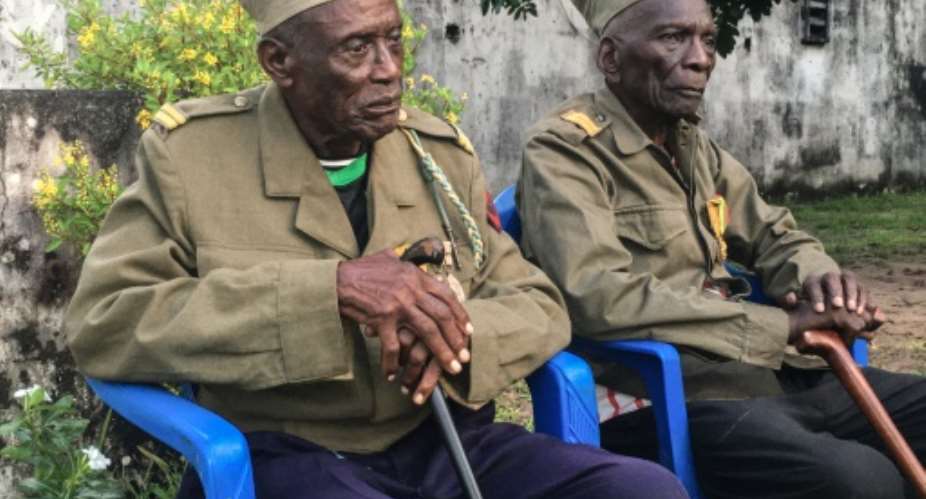Albert Kunyuku Ngoma was a young Congolese corporal in the colonial Belgian army when he was forced to battle in WWII as far away as Myanmar.
Now 97, Ngoma is one of only two surviving former members of the colonial "Public Force" military living in the DR Congo capital Kinshasa, who are honoured in a new documentary entitled "The Shadow of the Forgotten!".
Recalling the battles of six decades ago, Ngoma described fighting side by side with Belgium troops against the Japanese in Myanmar, which was then called Burma.
"In the trenches in Burma, we saw Belgian officers fall to enemy bullets," Ngoma said. "It was a real shock for us."
The Public Force was formed as a military unit when Belgium's King Leopold II controlled the colony. Thousands of Congolese were drafted as part of the colonial armed forces, and fought during WWII in east Africa, the Middle East and Asia.
Dressed in their worn-out former uniforms, Ngoma and his former brother-in-arms Daniel Miuki, 94, were praised as "living monuments" of Congolese history at a recent showing of the documentary by academic Jose Adolphe Voto.
In the film, the pair were shown proudly wearing their campaign medals on their chests as they recalled details of their postings from Leopoldville, as Kinshasa was once known, to the Middle East and to Burma, a former British colony invaded by the Japanese during the war.
Caps on their heads and canes in hand, two men leafed together through a yellowed photo album from Miuki's home showing pictures dating from 1940-1945.
American troops were not great shots, they recalled, but they praised the combat skills of the Japanese, Chinese and Korean troops on the ground.
'Tossed aside like towels'
Both remember the racial segregation they had to face even as they fought shoulder to shoulder with the Belgians.
 In the film the two recall details of their postings from Leopoldville, as Kinshasa was once known, to the Middle East and to Burma. By Manu Kalombo (AFP)
In the film the two recall details of their postings from Leopoldville, as Kinshasa was once known, to the Middle East and to Burma. By Manu Kalombo (AFP)
"We were like slaves, because it was Belgium that brought us into this war. We could not say anything," Ngoma said.
"When the bombs began to fall, white and black would die the same way," said Miuki, a former infantry nurse.
As Belgium's premier visited the DR Congo this week, Miuki criticised what he called the "ungrateful" attitude of the former colonial ruler towards its Congolese ex-soldiers, saying they were tossed aside "like dirty towels".
"France still takes care of Second World War veterans from its former colonies, and their heirs," Ngoma said.
Congolese soldiers never received any compensation from the countries for whom they fought in 1940-45, according to a complaint filed in 2018 in the DR Congo by seven children of ex-combatants from the Public Force.
They accuse the former colonial power as well as France, Britain and the United States of neglecting their parents and claimed more than $7 million (6.3 million euros), according to the Belgian Ministry of Defense.
The case was in court late last year, but no judgment has been made.
"I wanted to pay tribute to those who gave their all, not only for the Congo but in the World War," said Voto, the documentary director.
"I wanted them to be rewarded morally. When I spoke with them, I was disappointed to learn that they have never been recognised by Belgium."





 Supreme Court clears way for dual citizens to hold key public positions
Supreme Court clears way for dual citizens to hold key public positions
 Be transparent, don’t suppress the truth – Prof. Opoku-Agyemang to Jean Mensa
Be transparent, don’t suppress the truth – Prof. Opoku-Agyemang to Jean Mensa
 ‘I won’t tell the world I was only a driver’s mate during challenges’ – Prof Jan...
‘I won’t tell the world I was only a driver’s mate during challenges’ – Prof Jan...
 We’ll prosecute corrupt officials of Akufo-Addo’s govt – Prof Jane Naana
We’ll prosecute corrupt officials of Akufo-Addo’s govt – Prof Jane Naana
 [Full text] Acceptance speech by Prof Jane Naana Opoku-Agyemang as 2024 NDC Runn...
[Full text] Acceptance speech by Prof Jane Naana Opoku-Agyemang as 2024 NDC Runn...
 Election 2024: Don’t be complacent, we haven’t won yet – Asiedu Nketia cautions ...
Election 2024: Don’t be complacent, we haven’t won yet – Asiedu Nketia cautions ...
 Election 2024: Stop fighting over positions in Mahama’s next govt – Asiedu Nketi...
Election 2024: Stop fighting over positions in Mahama’s next govt – Asiedu Nketi...
 Prof Jane Naana Opoku-Agyemang will restore dignity of vice presidency – Fifi Kw...
Prof Jane Naana Opoku-Agyemang will restore dignity of vice presidency – Fifi Kw...
 'Ghana beyond aid' has turned out to be 'Ghana without compass' – Naana Opoku-Ag...
'Ghana beyond aid' has turned out to be 'Ghana without compass' – Naana Opoku-Ag...
 Nation builder Mahama will deliver on his promise of a 24-hour economy for the b...
Nation builder Mahama will deliver on his promise of a 24-hour economy for the b...
